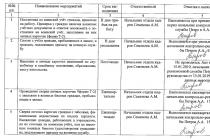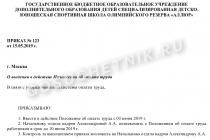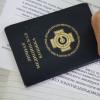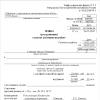Everything is not as simple as it seems.
Introduction to business practice the exchange of documents in electronic form revealed the need for their certification so that the papers have legal force. For this, an electronic signature (ES) was developed, but its use would be impossible without fixing the procedure at the legal level.
For this purpose, in 2002, Federal Law No. 1-FZ “On Electronic digital signature". With development electronic document management and its implementation in various areas economic activity there was a need for a new normative act, it was Federal Law No. 63-FZ of 04/06/2011 "On electronic signature(hereinafter - Law No. 63-FZ). In this article, we will review its main provisions, as well as learn about possible changes that may be made to it in the near future.
Its purpose is to regulate relations between counterparties when using an analogue of a visa and printing on paper. It is applied during transactions. different nature, including civil law. An electronic signature can be used when receiving state and municipal services, it is valid in the performance of the functions of state and municipal services during litigation and other disputes.
Electronic signature and its types
The law says that such is information in in electronic format, which can be attached to an electronic document to certify it, being an analogue of a conventional signature on paper. An electronic signature is:
- Simple. It is created using passwords and codes in order to confirm the fact that a document has been certified by a specific person. Used in normal business relations between legal or individuals, when considering cases in arbitration courts in the provision of public services.
- Reinforced unskilled. It is information encrypted in a cryptographic way. This encoding method eliminates the possibility of forging a signature, as well as making unauthorized changes to the document. Allows you to establish what changes have occurred with the signed document, determine the person who issued his visa. To create it, apply special means encryption. It can be used in the same areas of activity as a simple one, except for providing public services.
- Reinforced qualified. It has all the properties of an unqualified electronic signature, but for its creation, tools that have been certified by the Federal Security Service of the Russian Federation are used. In addition to all possible areas of application, it is also used in relations with regulatory authorities (FTS, FSS, PRF) and when participating in electronic trading.
Electronic signature verification key certificate
It confirms only enhanced electronic signatures, it is issued by a specialized organization or its confidant the owner of such an ES. Its main purpose is to confirm the fact of this ownership, to protect the rights of the owner of the electronic signature.
- Closed. With its help, an electronic signature is generated and the document is approved. The person who owns the ES must keep this information secret in order to prevent the use of the signature by another person.
- Open. It is inextricably linked with the previous key and is designed to determine the authenticity of the ES.
The certificate of the electronic signature verification key must contain the following information:
- unique number, validity;
- data of the owner of the certificate by which it can be identified;
- original ES verification key;
- the name of the digital signature means used;
- the standards that private and public keys conform to;
- name of the organization and address that issued the certificate.
In addition to these details, the qualified certificate must contain:
- insurance number of an individual personal account and TIN of the owner of this document for citizens, TIN - for organizations;
- ES verification key;
- name, address of the accredited organization that issued the certificate, number of its qualification certificate;
- data on restrictions imposed on the qualification certificate, if any.
The ES verification key certificate can be provided on paper or in electronic form. In the latter case, the owner of the document has the right to demand its certified copy on paper.
Note!
If the key certificate is received by the organization, then information is additionally indicated authorized person, which is responsible for the use of the digital signature. When there is no such employee - data of the head of the legal entity.
Information about the certificate of the digital signature verification key is entered in single register no later than the day on which the document enters into force. Such date is considered the day of its issuance, unless otherwise indicated in the certificate itself.
This document ceases to be valid after the expiration of the period specified in it or for the following reasons:
- at the written request of its owner, submitted on paper or in electronic form;
- when the organization that issued the certificate stops its work and does not transfer its functions to another person;
- by court order;
- in the case when the owner of the document ceased its activities, or due to the death of the owner - an individual.
The organization that issued the certificate of the electronic signature verification key may, on its own initiative, revoke the document if there is information that the certificate owner does not own the corresponding ES key or the document contains false data, which is confirmed by a court decision.
Information about the cancellation of the document is entered into the register of certificates within 12 hours from the moment the above circumstances occur. The organization that issued this document must notify its owner of the termination of the certificate.
Note!
The legislation of the Russian Federation does not provide for any liability for the use of a canceled certificate.
Means of electronic signature
According to the law, they are recognized as encryption devices that perform the creation of an electronic signature and the formation of ES keys, private and open.
Such funds should:
- determine the fact of amendments to the signed document;
- ensure the protection of the digital signature key from its unauthorized calculation;
- when signing a document, show information about it;
- create an ES only after confirmation by its owner;
- indicate the fact of signing the document;
- maintain confidentiality when a document containing data for restricted access is signed.
If electronic signature means are used when working with documents containing state secrets, then they are without fail are certified by the Federal Security Service of the Russian Federation.
Who issues electronic signatures and certificates to them in accordance with Federal Law No. 63-FZ "On Electronic Signature"
This right is granted to certification centers (CA), which may be private entrepreneurs, organizations of various forms of ownership, as well as municipal and government bodies. In addition to issuing ES and certificates of digital signature verification keys, CAs have the right to:
- at the request of the owner of the electronic signature key, confirm the right of such ownership;
- determine the period during which certificates of ES verification keys are valid;
- revoke the certificates issued by them;
- at the request of the applicant, issue electronic signature means;
- maintain registers of valid and revoked certificates of ES verification keys;
- determine the procedure for maintaining such registers, if unqualified certificates are registered in them, establish the procedure for access to this information;
- create digital signature keys of both types;
- check the uniqueness of these keys;
- at the request of persons who are participants in relations using ES, verify the authenticity of digital signatures;
- perform other actions related to the implementation of the provisions of Law No. 63-FZ.
CAs can be:
- Not accredited by the Ministry of Communications of the Russian Federation. They have the right to deal with issues related to enhanced unskilled ES.
- accredited by a federal agency. Such organizations have full authority, including matters relating to qualified digital signatures.
In accordance with the legislation of the Russian Federation, certification centers are liable for causing harm to citizens and organizations due to improper performance of their duties.
Note!
Certification centers can delegate their authority to issue key certificates to third parties. In such cases, they become the head DO in relation to those whom they have trusted.
What changes are planned to be made to Law No. 63-FZ
On April 3, 2018, the Ministry of Telecom and Mass Communications of the Russian Federation published draft amendments to this law in open access so that the public could consider them and make their comments. Major amendments to new edition concern:
- Introduction of the concept of "authoritative certificates".
They are divided into two types:
- Authorized certificate of a legal entity. In fact, this is a qualified certificate, the owner of which is the head of the organization, who has the right to carry out his actions without a power of attorney. In addition to information about the legal entity, the document contains information about the owner. This certificate is issued by the Ministry of Telecom and Mass Communications of the Russian Federation.
- Authority certificate state power. It is also qualified, its owner may be a Russian citizen, determined by the president or government of the Russian Federation. The document contains information about the authority whose official is the owner of the certificate, as well as data about this person. A document is issued by the CA of the Federal Treasury of the Russian Federation.
In both cases, certificate holders can delegate their powers, for this they will need to issue an electronic power of attorney, the concept of which also appears for the first time in this draft law.
- Rules for accreditation of certification centers.
Accredited CAs will be those organizations that, in the opinion of the Ministry of Telecom and Mass Communications, comply with the provisions of Law No. 63-FZ. They have the right to delegate their authority to issue certificates to the MFC and notaries. Accreditation can only be obtained by the Federal Treasury, state institutions subordinate to it, as well as state structures subordinated to the Ministry of Communications of the Russian Federation.
It follows from the draft law that commercial organizations will not be able to receive accreditation.
Summary
To certify electronic documents, an electronic signature was invented. To give it legal force, Federal Law No. 63-FZ of 04/06/2011 "On Electronic Signature" was adopted. Issues related to the ES are within the authority of the Ministry of Telecom and Mass Communications of the Russian Federation.
An electronic signature is information in electronic form that can be attached to an electronic document to certify it, being an analogue of a conventional signature on paper.
An electronic signature can be simple, it is created using passwords and codes in order to confirm the fact that a document has been certified by a specific person, and enhanced (qualified and unqualified), created using cryptographic encryption. These types of electronic signatures are used for various purposes.
To create and verify an electronic signature, there are electronic signature tools that have certain properties. When issuing a digital signature, a certificate of the verification key is issued. He may or may not be qualified. Certification centers are responsible for issuing electronic signatures. They can be accredited by the Ministry of Telecom and Mass Communications of the Russian Federation and in this case receive special powers.
Amendments are planned to Law No. 63-FZ. They concern the introduction of the concept of "authorized certificates" and changes in the rules for accreditation of certification centers.
The issue of electronic signature is complex and has many nuances. Therefore, in one article it is impossible to consider all points. If you have any questions, please contact our professional lawyers. They will provide comprehensive advice on this topic.
In view of the fact that the use of an electronic digital signature has become more and more necessary every year, both for civil law transactions and for participation in electronic auctions at the municipal or commercial level, Federal Law No. 63 on electronic signature was developed and adopted.
It describes the types of EDS and regulates the principles of its use and the relationships that fall under this area. As well as many other aspects related to the use of electronic digital signature.
According to the law 63-FZ on electronic signature, only certification centers have the right to issue an EDS, and a qualified electronic signature with increased protection and special qualified key, only state-accredited certification centers.
This Federal Law describes existing species electronic signatures: simple and enhanced. Reinforced, in turn, can be unskilled and qualified. How they differ, and what features each of them has is described in detail in Art. 5 63-FZ.
Federal Law No. 63 on EDS also controls the activities and obligations of Certification Centers that are entitled to issue EDS. The Government of the Russian Federation determines the authorized federal body, which performs the functions of the leading organization among the other accredited certification centers and is responsible for all activities related to the fulfillment of their duties by the centers. For example, the authorized federal body must accredit certification centers, monitor their performance of their duties, publish lists and addresses of existing organizations, as well as centers whose activities have been terminated or suspended.
You can read more detailed information about what functions the authorized federal body performs in Art. 8 FZ-63 on electronic signature.
Law 63-FZ: paragraphs and articles
The main articles of 63 of the Federal Law are as follows:
principles and rules use of EDS;
the procedure for issuing an ES and a qualified certificate in a certification center;
types of signature and features of the use of each of them;
grounds for recognizing the EDS as equivalent to a handwritten signature and, therefore, the equality of a certified electronic document with a paper one;
the possibility of using EDS to certify any documents, including by public authorities;
rights and obligations of the person who uses the ES.
A procurement participant needs an EDS in order to submit documents for participation in procurement in electronic form: documents without a signature are not accepted. To obtain it, you must apply directly to an accredited certification center or contact RusTender for a simpler and faster registration.
63-FZ - the basic concepts of the law
Federal Law 63 on electronic signature defines the basic concepts used in the field of using electronic digital signature, such as: electronic signature, key certificate EDS checks, EDS key, EDS verification key, certification authority and much more.
63-FZ has a clear description and guidance on how to obtain, use and store a digital signature, which cannot be neglected.
The Electronic Signature Law prohibits:
transfer EDS to unauthorized persons;
leave the flash drive unattended;
ignore the rules for storing and protecting digital signatures.
Download latest edition
You can download FZ-63 dated 06/28/14 with the latest changes and comments on our website and study it yourself.
We always monitor the relevance of placed legislative acts so that you have access to the latest editions of laws.
OOO IWC"RusTender"
The material is the property of the site. Any use of the article without indicating the source - the site is prohibited in accordance with article 1259 of the Civil Code of the Russian Federation
Article 2 Basic concepts used in this Federal Law.
For the purposes of this Federal Law, the following basic concepts are used:
– electronic signature - information in electronic form, which is attached to other information in electronic form (signed information) or otherwise associated with such information and which is used to identify the person signing the information;
- participants in electronic interaction - state bodies, local governments, organizations, as well as citizens exchanging information in electronic form;
- corporate information system - an information system, the participants of electronic interaction in which constitute a certain circle of persons;
- public information system - an information system, the participants of electronic interaction in which constitute an indefinite circle of persons and in the use of which these persons cannot be denied.
Article 6 Conditions for recognizing electronic documents signed with an electronic signature as equivalent to paper documents signed with a handwritten signature.
1. Information in electronic form signed with a qualified electronic signature is recognized as an electronic document equivalent to a paper document signed with a handwritten signature, unless federal laws or regulations adopted in accordance with them legal acts a requirement is established that the document must be drawn up exclusively on paper.
2. Information in electronic form, signed with a simple electronic signature or an unqualified electronic signature, is recognized as an electronic document equivalent to a paper document signed with a handwritten signature, in cases established by federal laws, regulatory legal acts adopted in accordance with them, or an agreement between participants in an electronic interactions. Regulatory legal acts and agreements between participants in electronic interaction that establish cases for recognizing electronic documents signed with an unqualified electronic signature as equivalent to paper documents signed with a handwritten signature should provide for the procedure for verifying an electronic signature. Normative legal acts and agreements between participants in electronic interaction establishing cases of recognition of electronic documents signed with a simple electronic signature as equivalent to paper documents signed with a handwritten signature must comply with the requirements of Article 9 of this Federal Law.
4. Several interconnected electronic documents (package of electronic documents) can be signed with one electronic signature. When signing a package of electronic documents with an electronic signature, each of the electronic documents included in this package is considered to be signed with an electronic signature of the type that signed the package of electronic documents.
1) electronic signature - information in electronic form, which is attached to other information in electronic form (signed information) or otherwise associated with such information and which is used to identify the person signing the information;
2) certificate of the electronic signature verification key - electronic document or a paper document issued by a certification center or an authorized representative of the certification center and confirming that the electronic signature verification key belongs to the owner of the electronic signature verification key certificate;
3) a qualified certificate of an electronic signature verification key (hereinafter referred to as a qualified certificate) - a certificate of an electronic signature verification key issued by an accredited certification center or a trustee of an accredited certification center or a federal executive body authorized in the field of using an electronic signature (hereinafter referred to as an authorized federal body) ;
4) the owner of the certificate of the electronic signature verification key - a person who, in accordance with the procedure established by this Federal Law, has been issued a certificate of the electronic signature verification key;
6) electronic signature verification key - a unique sequence of characters uniquely associated with the electronic signature key and designed to verify the authenticity of an electronic signature (hereinafter referred to as electronic signature verification);
7) certification authority - entity or individual entrepreneur those performing the functions of creating and issuing certificates of electronic signature verification keys, as well as other functions provided for by this Federal Law;
8) accreditation of a certification center - recognition by an authorized federal body of the compliance of a certification center with the requirements of this Federal Law;
9) electronic signature means - encryption (cryptographic) means used to implement at least one of following functions- creation of an electronic signature, verification of an electronic signature, creation of an electronic signature key and an electronic signature verification key;
11) participants in electronic interaction - state bodies, local government bodies, organizations, as well as citizens exchanging information in electronic form;
12) corporate information system - an information system, the participants of electronic interaction in which constitute a certain circle of persons;
13) public information system - an information system, the participants of electronic interaction in which constitute an indefinite circle of persons and in the use of which these persons cannot be denied.
1. Relations in the field of the use of electronic signatures are governed by this Federal Law, other federal laws, regulatory legal acts adopted in accordance with them, as well as agreements between participants in electronic interaction. Unless otherwise established by federal laws, regulatory legal acts adopted in accordance with them, or a decision to create a corporate information system, the procedure for using an electronic signature in a corporate information system may be established by the operator of this system or by an agreement between participants in electronic interaction in it.
2. The types of electronic signatures used by executive authorities and local governments, the procedure for their use, as well as the requirements for ensuring the compatibility of electronic signature means when organizing electronic interaction between these bodies, are established by the Government of the Russian Federation.
1) the right of participants in electronic interaction to use an electronic signature of any kind at their own discretion, if the requirement to use a specific type of electronic signature in accordance with the purposes of its use is not provided for by federal laws or regulatory legal acts adopted in accordance with them or by an agreement between participants in electronic interaction;
2) the possibility for participants to use electronic interaction at their own discretion, any information technology and/or technical means, allowing to fulfill the requirements of this Federal Law in relation to the use of specific types of electronic signatures;
3) the inadmissibility of recognizing an electronic signature and (or) an electronic document signed by it as null and void only on the basis that such an electronic signature was not created by one's own hand, but using electronic signature tools for the automatic creation and (or) automatic verification of electronic signatures in information system.
1. Types of electronic signatures, relations in the field of use of which are regulated by this Federal Law, are a simple electronic signature and an enhanced electronic signature. A distinction is made between an enhanced unqualified electronic signature (hereinafter referred to as an unqualified electronic signature) and an enhanced qualified electronic signature (hereinafter referred to as a qualified electronic signature).
2. A simple electronic signature is an electronic signature that, through the use of codes, passwords or other means, confirms the fact of the formation of an electronic signature by a certain person.
4. A qualified electronic signature is an electronic signature that meets all the features of a non-qualified electronic signature and the following additional features:
2) to create and verify an electronic signature, electronic signature tools are used that have received confirmation of compliance with the requirements established in accordance with this Federal Law.
5. When using an unqualified electronic signature, an electronic signature verification key certificate may not be created if the compliance of the electronic signature with the characteristics of an unqualified electronic signature established by this Federal Law can be ensured without using an electronic signature verification key certificate.
Article 6
1. Information in electronic form signed with a qualified electronic signature is recognized as an electronic document equivalent to a paper document signed with a handwritten signature, unless federal laws or regulatory legal acts adopted in accordance with them establish a requirement that the document be drawn up exclusively on paper. carrier.
2. Information in electronic form, signed with a simple electronic signature or an unqualified electronic signature, is recognized as an electronic document equivalent to a paper document signed with a handwritten signature, in cases established by federal laws, regulatory legal acts adopted in accordance with them, or an agreement between participants in an electronic interactions. Regulatory legal acts and agreements between participants in electronic interaction that establish cases for recognizing electronic documents signed with an unqualified electronic signature as equivalent to paper documents signed with a handwritten signature should provide for the procedure for verifying an electronic signature. Normative legal acts and agreements between participants in electronic interaction establishing cases of recognition of electronic documents signed with a simple electronic signature as equivalent to paper documents signed with a handwritten signature must comply with the requirements of Article 9 of this Federal Law.
3. If, in accordance with federal laws, regulatory legal acts adopted in accordance with them, or business practice, a document must be certified by a seal, an electronic document signed with an enhanced electronic signature and recognized as equivalent to a paper document signed with a handwritten signature is recognized as equivalent to a document on hard copy, signed with a handwritten signature and certified by a seal. federal laws, adopted in accordance with them, regulatory legal acts or an agreement between participants in electronic interaction may provide for Additional requirements to an electronic document in order to recognize it as equivalent to a document on paper, certified by a seal.
2. An electronic signature and an electronic document signed by it cannot be considered invalid only on the grounds that the certificate of the electronic signature verification key was issued in accordance with the norms of foreign law.














